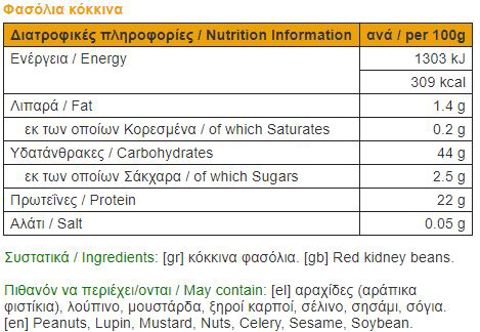FREE SHIPPING & DISCOUNTS
Free shipping on orders over 90 euros, enjoy 5% discount on orders over 40 euros. Get an additional 3% off on orders over 60 euros
shipping & paymentsKidney beans, and other beans such as pinto beans, navy beans and black beans are known as Phaseolus vulgaris. They are all referred to as common beans, probably owing to the fact that they are derived from a common bean ancestor originating in Peru. From there, beans were spread throughout South and Central America by migrating Indian trades. Beans were introduced into Europe in the 15th century by Spanish explorers returning from their voyages to the New World.
Just like its name suggests, the kidney bean is shaped like a kidney. They hold their shape very well while being cooked and readily absorb surrounding flavors, they are a favorite bean to use in summered dishes.
Kidney beans are an excellent source of cholesterol-lowering fiber, like most other beans. In addition to lowering cholesterol, kidney beans' high fiber content prevents blood sugar levels from rising too rapidly after a meal, making these beans an excellent choise for individuals suffering from diabetes, insulin resistance or hypoglycemia. When combined with whole grains, such as brown rice, pinto beans provide virtually fat-free, high quality protein. Additionally, kidney beans contain a very important trace mineral called molybdenum, which helps in detoxifying sulfites from within the body.
• Kidney beans are rich in soluble and insoluble fiber. Soluble fiber forms a gel-like substance in the digestive tract that binds with bile, which contains cholesterol and ferries it out of the system. On the other hand, insoluble fiber increases tool bulk and prevents constipation, as well as preventing digestive issues like irritable bowel syndrome and diverticulosis.
• Kidney beans contain folate and magnesium, both of which aid in optimal heart health. Folate helps lower levels of homocysteine. Elevated blood levels of homocysteine are an independent risk factor for heart attack, stroke or peripheral vascular disease. The magnesium present in pinto beans also has beneficial cardiovascular effects, as it is a natural calcium channel blocker. Potassium, an important electrolyte involved in nerve transmission and the contraction of all muscles, including the heart. This mineral, which is also found in pinto beans is essential for maintaining normal blood pressure and heart function.
• Due to the beans' high fiber content, low glycemix index, antioxidant effects and polyphenol content, they can contribute in normalizing blood sugar levels in individuals suffering from diabetes, insulin resistance or hypoglycemia.
• The manganese found in kidney beans acts as an antioxidant defense. This helps to reduve free radicals in mitochindria at the cellular level. They also contain vitamin K that is known to protect the cells from oxidative stress and further reduce the risks of cancer.
• Vitamin K is present in abundance in kidney beans. It is a vitamin very beneficial for the brain and nervous system. The myelin sheath requires sphingo-lipids for proper formation and vitamin K helps in the synthesis of those lipids that aid in healthy brain and nervous functioning. Kidney beans also contain thiamine, also known as vitamin B1 that is essential for optimal cognitive function and acetylcholine synthesis.
• Kidney beans are a rich source of iron that increases one's energy levels. Iron is also essential for the body's metabolism and energy production. The manganese content in kidney beans also contributes to the overall production of energy needed by the body.
• Kidney beans are rich in protein and can be an excellent substitute for meat or other dairy products. Optimally, kidney beans should be consumed with whole grain foods for a more complete nutrition.


Free shipping on orders over 90 euros, enjoy 5% discount on orders over 40 euros. Get an additional 3% off on orders over 60 euros
shipping & payments